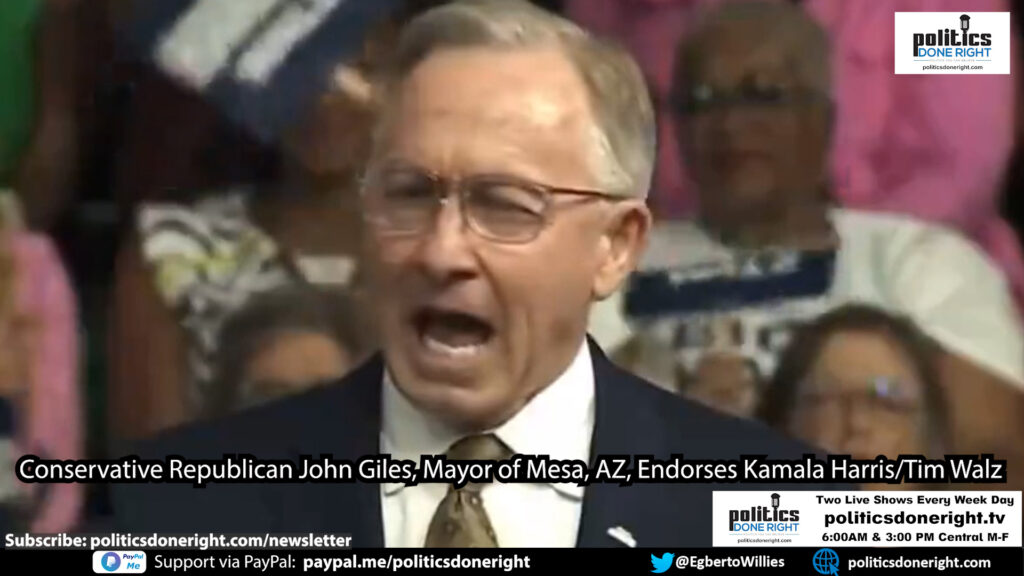In a full-throated endorsement, Mesa, AZ, Conservative Republican Mayor John Giles endorsed VP Kamala Harris and Gov. Tim Walz for President and vice president of the United States. He said extremists took over the party.
Republican Mayor John Giles Endorses Kamala Harris
Podcasts (Video — Audio)
In a political climate where ideological lines seem more rigid than ever, the endorsement of Vice President Kamala Harris and Minnesota Governor Tim Walz by Mesa, Arizona’s conservative Republican mayor, John Giles, sends ripples through the American political landscape. This significant move highlights the growing dissatisfaction within the Republican Party, particularly among those who no longer recognize the party they once called home. Giles’ endorsement is not merely a gesture of political dissent; it is a clarion call for Republicans to put country over party and to stand against what he perceives as the dangerous extremism that has taken root in the GOP.
Mayor John Giles, a lifelong Republican, took the stage at a rally in Arizona, speaking from the heart about his disillusionment with the current state of the Republican Party. His message was clear: the party has been hijacked by extremists who are determined to force moderates and centrists out of the fold. For Giles, this is a betrayal of the principles that once defined the GOP—a party that, in his view, has become unrecognizable.
Giles’ public repudiation of the current Republican leadership and his endorsement of the Harris-Walz ticket underscores a broader trend of conservative and centrist Republicans abandoning ship. These “Never Trumpers,” as they are often called, are a growing faction within the GOP. They are not merely silent dissenters but are increasingly becoming active supporters of candidates who they believe can restore decency, integrity, and the rule of law to American politics. Giles’ endorsement is part of this wave of defections, where loyalty to the party is being replaced by loyalty to the country and its democratic ideals.
In his speech, Giles invoked the legacy of the late Senator John McCain, a figure revered by many for his commitment to putting country above party politics. This reference to McCain is particularly poignant given the late senator’s contentious relationship with the more extreme elements of the GOP, especially under Donald Trump’s leadership. By aligning himself with McCain’s ethos, Giles is appealing to those Republicans who still believe in integrity, bipartisanship, and the rule of law—values they feel have been abandoned by today’s Republican Party.
Giles’ endorsement of Kamala Harris and Tim Walz is a bold move, especially in a state like Arizona, which has long been a Republican stronghold. However, Arizona is also in flux, having narrowly flipped blue in the 2020 presidential election. The state’s shifting political landscape reflects a broader national trend where demographic changes and growing disillusionment with Trumpism are reshaping the political map. Giles’ endorsement could further erode Republican dominance in Arizona as more moderate and centrist voters look for alternatives to a party they no longer recognize.
This endorsement comes when the Republican Party grapples with its identity and future direction. The party’s embrace of Trumpism, characterized by nativism, populism, and a disdain for democratic norms, has alienated many traditional Republicans. These Republicans find themselves politically homeless, caught between a party that no longer represents their values and a Democratic Party that, while ideologically different, offers a more palatable alternative to the extremism they see in their ranks.
Giles’ decision to endorse Harris and Walz is not just about rejecting Trump and his brand of politics but about affirming a commitment to democracy, the Constitution, and the rule of law. By supporting a Democratic ticket, Giles states that these values transcend party lines. His message to fellow Republicans is clear: you do not owe loyalty to a party that has lost its way, and you certainly do not owe loyalty to a candidate who is, in Giles’ words, “morally and ethically bankrupt.”
In many ways, Giles’ endorsement reflects the broader struggle for the Republican Party’s soul. As more Republicans like Giles speak out, the question remains: Will the GOP continue down the path of extremism, or will it find a way to reclaim its traditional values? The answer to this question could have profound implications for the future of American politics.
As the 2024 election approaches, endorsements like Giles could be crucial in shaping the outcome. His decision to back Harris and Walz may encourage other disaffected Republicans to do the same, potentially tipping the scales in a closely contested election. More importantly, it could signal a broader realignment in American politics, where the center holds the key to the nation’s future.
Mayor John Giles’ endorsement of Kamala Harris and Tim Walz is significant in American politics. It highlights the deep divisions within the Republican Party and the growing number of conservatives who are choosing country over party. As Giles himself said, “You owe no displaced loyalty to a morally and ethically bankrupt candidate.” This message resonates not just with Republicans but with all Americans who value democracy and the rule of law. In these polarized times, endorsements like Giles remind us that the most important allegiance is not to a party but to the principles that define our nation.

